NoSQL databases are crucial for modern software development and startups, offering flexibility and scalability that traditional SQL databases can't match. With the ever-increasing amount of data generated by applications, from social media interactions to IoT applications, efficient data processing solutions are essential. The NoSQL Database Google Cloud provides a robust platform for handling large datasets with high throughput and low latency, making it an optimal choice for businesses that leverage big data.
At Aloa, we specialize in software outsourcing, guiding businesses and startups through the complexities of selecting the right technology stack. We help our clients deploy scalable applications that efficiently manage large amounts of data. Our approach integrates best practices in database management and ensures that our clients can focus on innovation while we handle the technological heavy lifting.
Utilizing insights from our extensive research, we've compiled this guide on the NoSQL Database Google Cloud. Our review delves into its features, use cases, benefits, and some alternatives that might better fit based on specific needs. After reading, you'll understand how to improve query performance, scale your applications effectively, and make informed decisions for your next project.
Let's get started!
What is NoSQL Database Google Cloud?
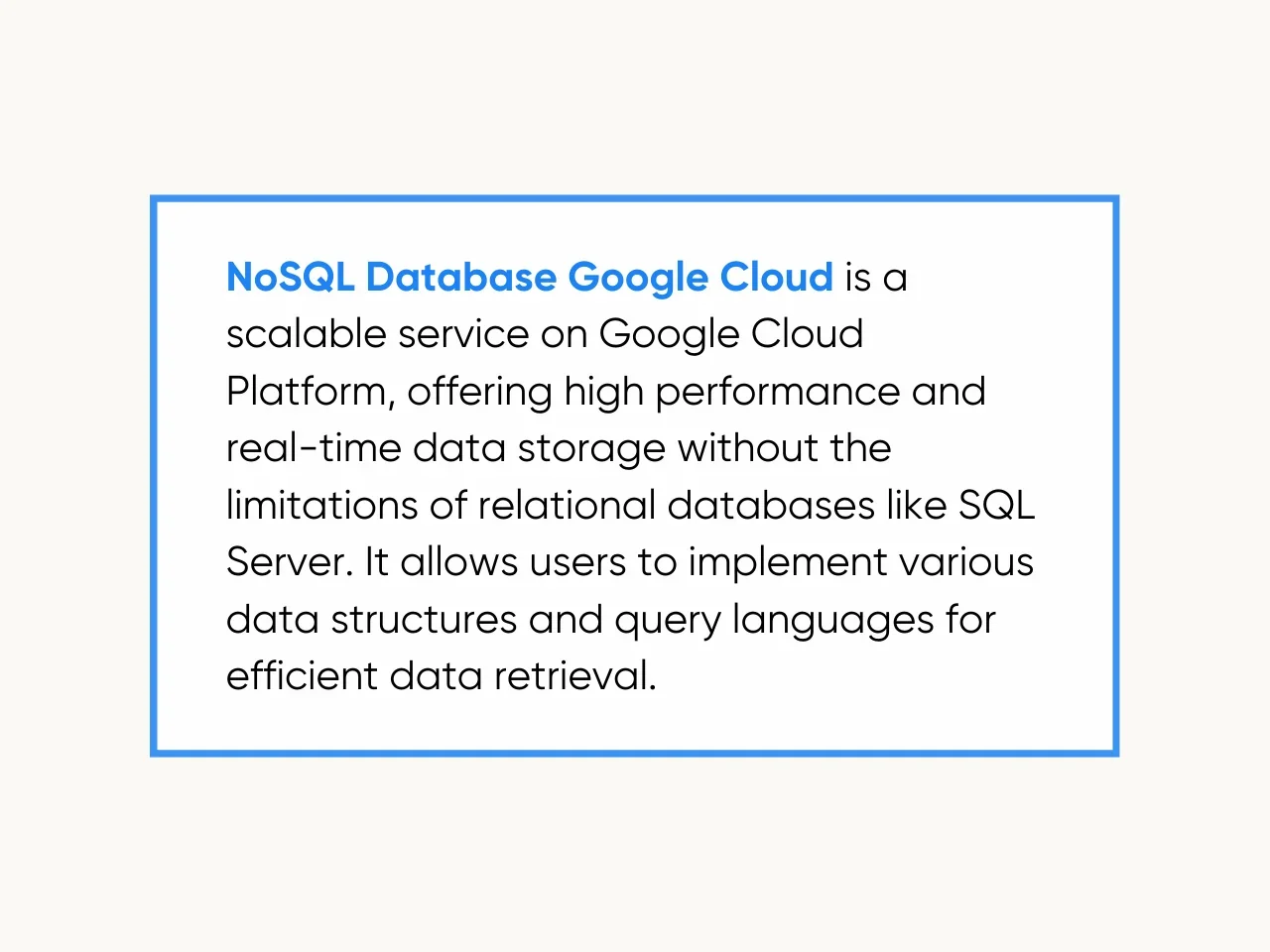
NoSQL Database Google Cloud is a scalable database service provided by Google Cloud Platform. It offers high performance and real-time data storage without the limitations of relational databases like SQL Server. Users can implement various data structures and query languages to store and retrieve data efficiently.
NoSQL Database Google Cloud Products
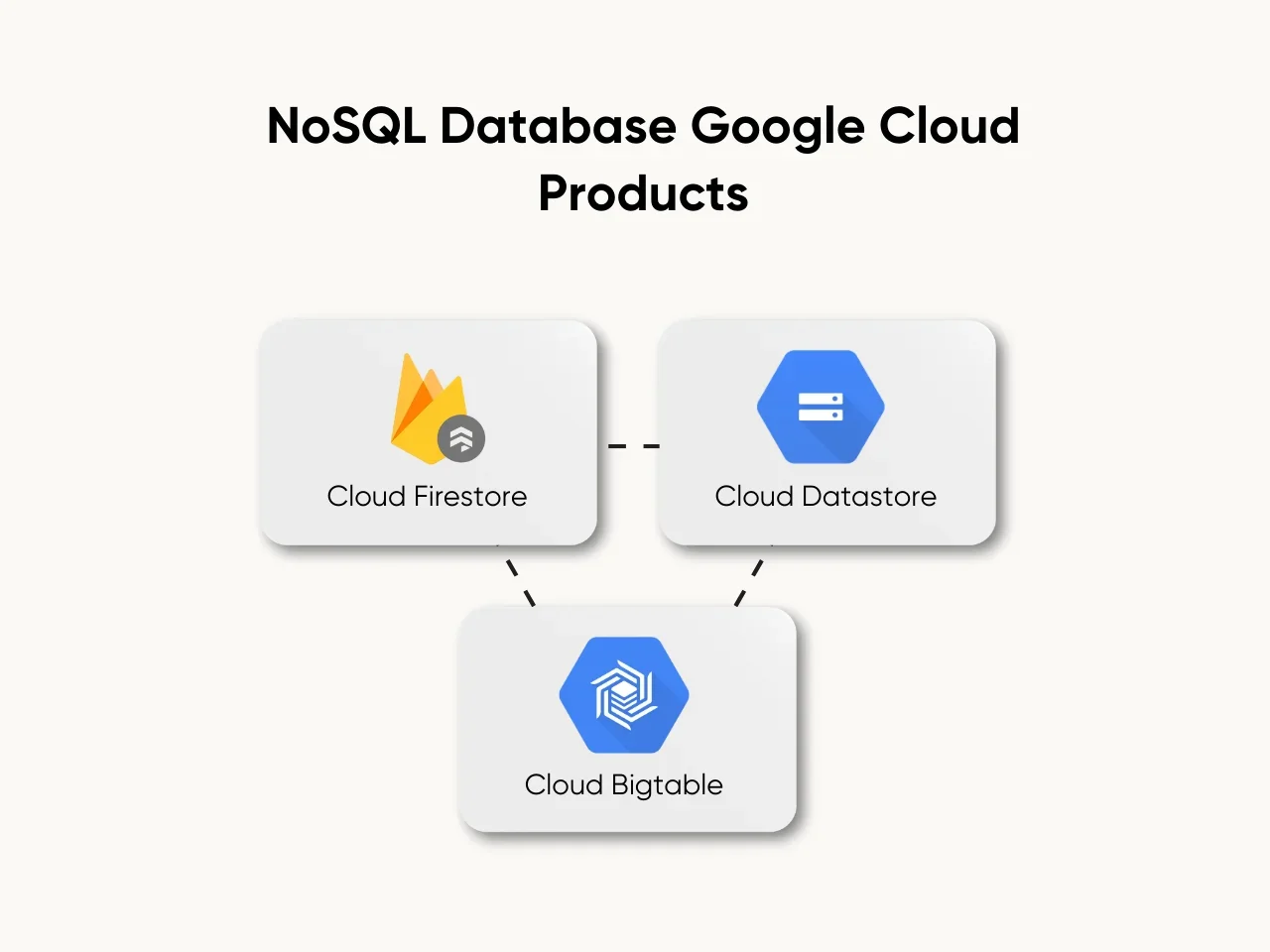
Google Cloud Platform offers several NoSQL database products to cater to different use cases and scalability requirements. Here are three notable ones:
- Cloud Firestore: Cloud Firestore is a flexible, scalable database for high-performance app development. It enables real-time data synchronization and offers functionality for building responsive applications. Features like automatic scaling and data replication are ideal for dynamic applications requiring real-time updates.
- Cloud Datastore: Google Cloud Datastore provides a highly available, fully managed NoSQL database for storing non-relational data. It offers high performance and seamless integration with other Google Cloud services, making it suitable for building scalable applications and pipelines.
- Cloud Bigtable: Cloud Bigtable is a fully managed, highly scalable NoSQL database service for large analytical and operational workloads. It's optimized for high throughput and low latency, making it ideal for real-time analytics, machine learning, and time-series data.
NoSQL Database Google Cloud products cater to diverse application needs, providing developers with efficient tools to store and retrieve data, whether for real-time analytics, app deployment, or machine learning pipelines.
Use Cases for NoSQL Google Cloud Products
NoSQL Database Google Cloud offers versatile, scalable solutions for handling large-scale data needs across various industries. These use cases show NoSQL Database Google Cloud's flexibility in addressing diverse needs, from real-time applications to large-scale storage and sophisticated analytical tasks.
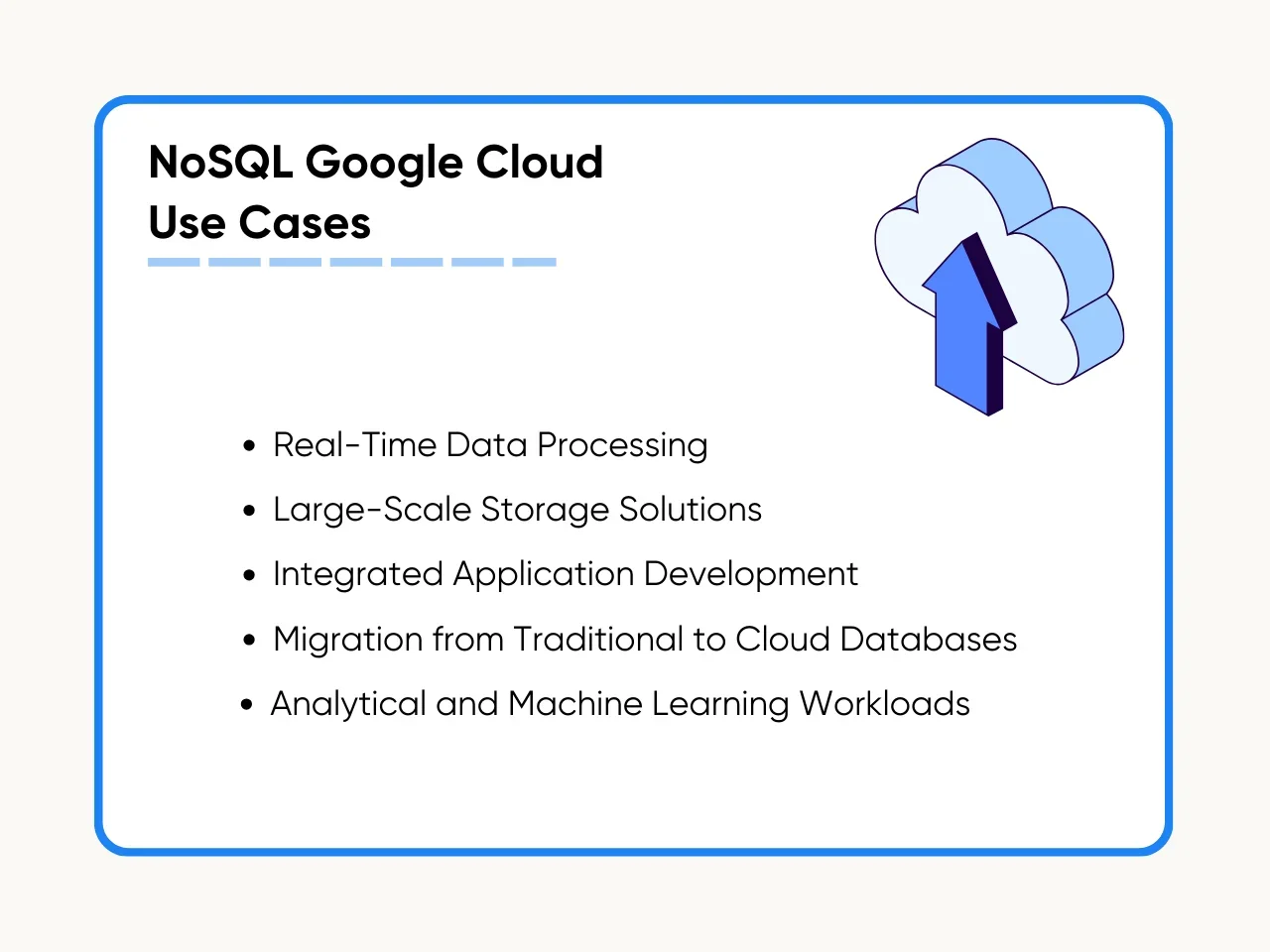
Real-Time Data Processing
Utilize Firebase Realtime Database for immediate synchronization and updates across user interfaces. Perfect for apps requiring instant data reflection without delays, it enhances user experience and operational efficiency.
Large-Scale Storage Solutions
Leverage Cloud Storage and NoSQL Database Google Cloud for massive, unstructured data sets. It is ideal for enterprises that require extensive storage with quick access and high durability, like media or research data.
Integrated Application Development
Combine Google App Engine with Cloud Spanner to develop and deploy scalable applications. This setup supports robust database management with solid consistency and global transaction capabilities, critical for large-scale, complex applications.
Migration from Traditional to Cloud Databases
Migrating to cloud databases refers to transition from legacy systems like MySQL and Hadoop to NoSQL Database Google Cloud using tools and tutorials provided by Google Cloud. This enhances scalability and performance while reducing maintenance overhead.
Analytical and Machine Learning Workloads
Utilize the processing power of Compute Engine and AI capabilities with NoSQL Database Google Cloud to run complex queries and algorithms. Such tools are suitable for businesses implementing AI-driven strategies to gain insights from large datasets.
NoSQL Database Google Cloud supports dynamic, scalable, and flexible data management solutions. These databases meet the needs of modern applications with varied data types and large volumes.
Google Cloud NoSQL Products: Core Tools and Notable Features
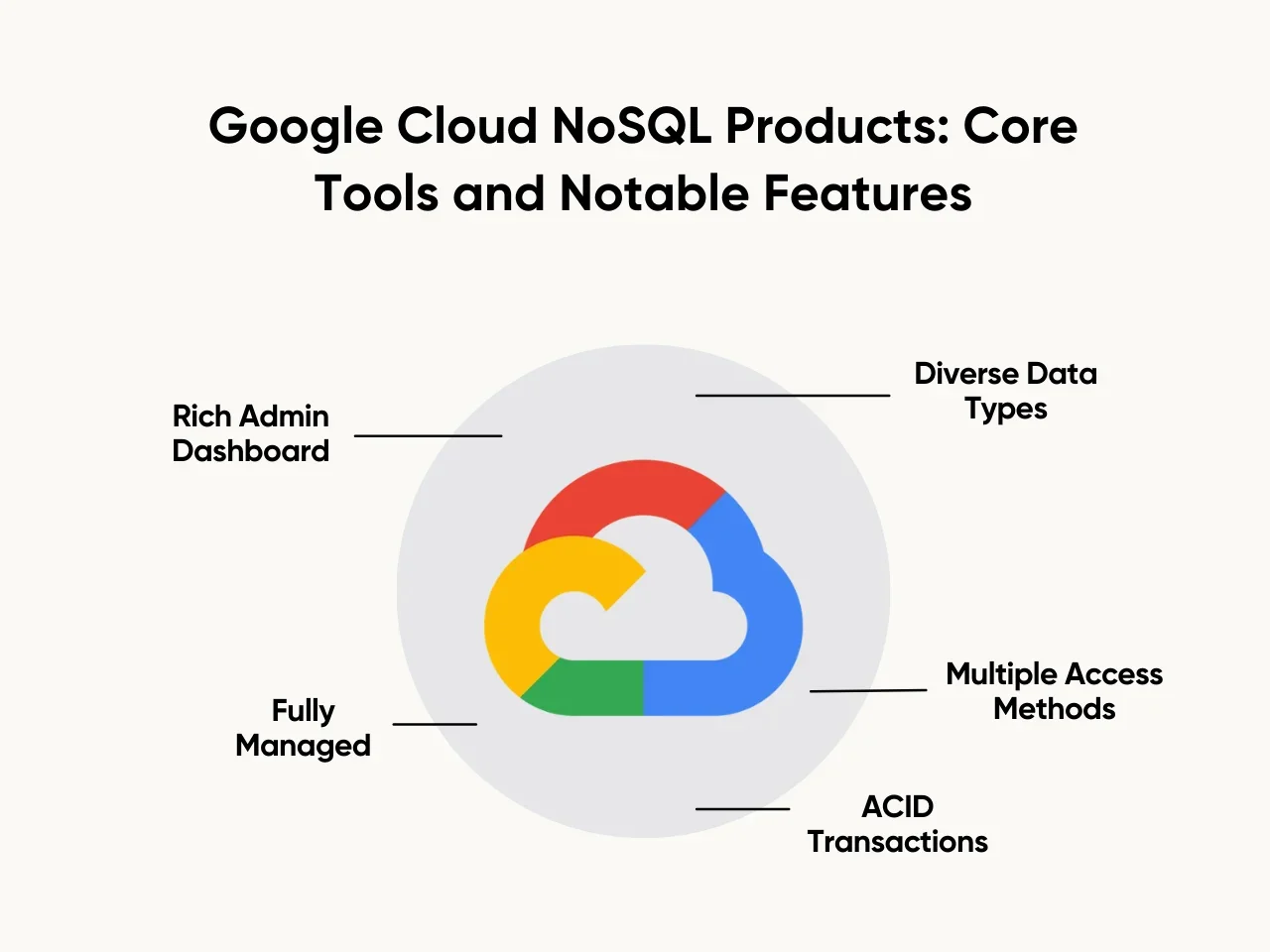
Google Cloud NoSQL products offer a range of core tools designed for high performance, scalability, and easy integration. They cater to diverse application needs, from web apps to mobile platforms, ensuring efficient data management without the overhead of traditional database systems.
Rich Admin Dashboard
Google Cloud NoSQL products provide a comprehensive admin dashboard. Users can view entity statistics, query their databases, manage indexes, and perform backups or restores effortlessly. This dashboard is a central feature for effective database management, enhancing productivity and control over data.
Diverse Data Types
The flexibility to handle various data types is crucial. Google Cloud's NoSQL databases, like Datastore, support integers, floating-point numbers, strings, dates, and binary data. This versatility allows developers to store and manipulate various data formats, facilitating complex applications.
Multiple Access Methods
Google Cloud offers multiple ways to access your data. Whether through JSON API, open-source clients, or community-maintained ORMs like Objectify and NDB, these access methods provide flexibility and ease of integration with existing systems.
ACID Transactions
Reliability in data processing is non-negotiable. Google Cloud NoSQL products ensure data integrity through ACID transactions. These transactions guarantee that all operations within a single process succeed or fail, maintaining data consistency and reliability.
Fully Managed
Maintenance ease is a significant advantage of Google Cloud NoSQL databases. They are fully managed, which means Google handles sharding and replication automatically. This management ensures high availability and consistent performance across the board, allowing developers to focus more on application development than database maintenance.
Pros and Cons of Using NoSQL Google Cloud
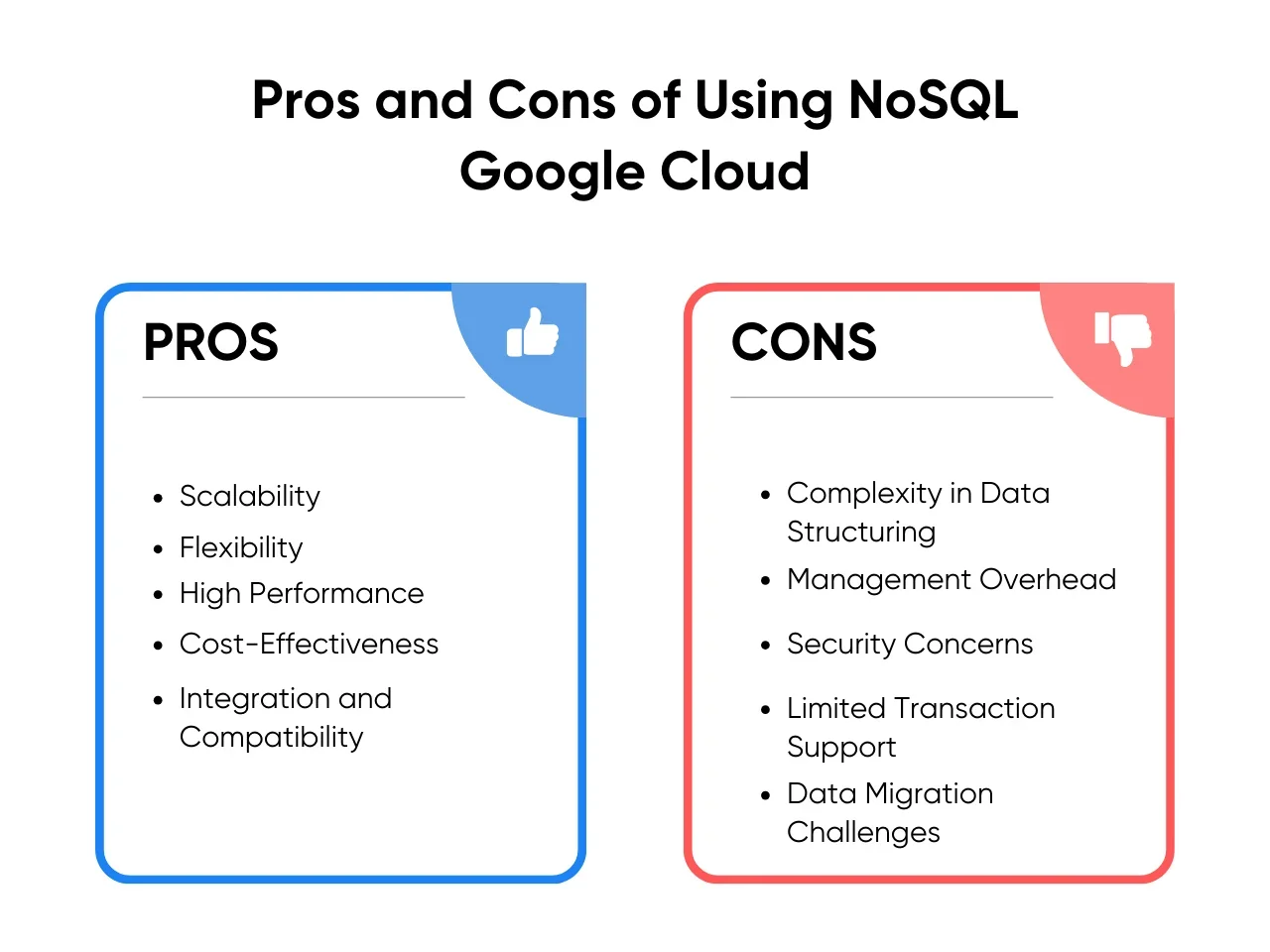
When managing data on a large scale, NoSQL Database Google Cloud offers robust solutions tailored for various applications. This platform supports the dynamic handling of unstructured data, making it ideal for big data and real-time web apps. Here, we explore the advantages and challenges of utilizing the Google Cloud NoSQL database.
Pros of Using NoSQL Google Cloud
NoSQL Database Google Cloud offers several advantages that make it an appealing choice for organizations looking to manage diverse datasets efficiently.
- Scalability: One of the key strengths of the NoSQL Database Google Cloud is its scalability. It easily handles sudden spikes in data or traffic, making it ideal for applications that experience variable workloads.
- Flexibility: NoSQL databases do not require a fixed schema, allowing businesses to modify their databases without downtime. This flexibility is crucial for companies that adapt quickly to changing requirements.
- High Performance: The Google Cloud NoSQL database is designed for high performance. It supports fast data retrieval and processing, essential for real-time applications.
- Cost-Effectiveness: With its efficient scaling and management, Google Cloud NoSQL Database can be more cost-effective than traditional SQL databases, especially for large-scale applications.
- Integration and Compatibility: NoSQL database Google Cloud integrates well with other Google services, providing a seamless environment for developers. This compatibility helps build and deploy applications efficiently.
Cons of Using NoSQL Google Cloud
While Google Cloud NoSQL Database has many benefits, challenges and drawbacks exist.
- Complexity in Data Structuring: The flexibility of NoSQL can also be a disadvantage. The lack of schema enforcement can lead to data inconsistency if incorrectly managed.
- Management Overhead: NoSQL databases require different management and maintenance skills from traditional SQL databases. This can increase the learning curve and operational overhead.
- Security Concerns: NoSQL databases, including those on Google Cloud, can present unique security challenges. Ensuring data security requires thorough knowledge and appropriate configuration.
- Limited Transaction Support: NoSQL Database Google Cloud generally offers limited transaction support compared to SQL databases. This can be a drawback for applications that require atomicity and consistency across multiple operations.
- Data Migration Challenges: Migrating from traditional SQL databases to NoSQL Database Google Cloud can be challenging due to differences in data models and query languages.
NoSQL Google Cloud Product Reviews
Discover the strengths and potential drawbacks reported by users, helping you decide whether these tools fit your data handling needs. Let's explore what users say about these products on various review platforms.
1. Cloud Firestore
Cloud Firestore is a highly scalable, serverless, NoSQL document database that simplifies storing, syncing, and querying data for your apps. A part of Google Cloud's powerful platform, it integrates seamlessly with Firebase and other Google services, enhancing mobile and web application development.
Rating:
- Capterra: 4.6/5
- G2: 4.7/5
- Slashdot: 4.5/5
Positive Review: Customers appreciate Cloud Firestore's real-time data synchronization and seamless integrations with other Google services. The platform's ability to scale dynamically is praised as ideal for growing applications. Users also find the setup process straightforward, making it accessible even for those with minimal backend experience.
Negative Review: Some users report challenges with Firestore's query limitations, which can hinder complex data operations. The cost structure can be confusing and potentially expensive for large data volume operations. Additionally, extensive documentation can sometimes be overwhelming for new users.
Considering its powerful real-time capabilities and seamless integration with other Google services, Cloud Firestore is ideal for developers looking for an efficient and scalable NoSQL database solution. Potential users should evaluate cost implications based on their expected data usage.
2. Google Cloud Datastore
Google Cloud Datastore is a fully managed, highly scalable NoSQL database designed for automatic sharding and replication. It's built to provide a durable database that effortlessly scales to meet the demands of any application's load, making it an ideal choice for mobile and web applications.
Rating:
- Capterra: 4.4/5
- G2: 4.3/5
- GetApp: 4.3/5
Positive Review: Users appreciate Google Cloud Datastore's robust scalability and automatic management of sharding and replication. They highlight its performance, particularly in handling large-scale applications effortlessly. The platform's integration with other Google Cloud services also receives positive remarks, enhancing overall functionality.
Negative Review: Some users express concerns over the complex pricing structure, which can be challenging to understand and predict costs effectively. Documentation is extensive but can be overwhelming for newcomers. Additionally, a few mention that while the platform is powerful, it requires a steep learning curve to utilize its full potential.
Google Cloud Datastore is recommended for businesses seeking a scalable and reliable NoSQL database solution. It is particularly suited for those already invested in the Google Cloud ecosystem, needing a database that grows seamlessly with their application's demands.
3. Google Cloud Bigtable
Google Cloud Bigtable is a fully managed, scalable NoSQL database service designed for large analytical and operational workloads. Built on Google's infrastructure, it is renowned for handling massive amounts of structured data with high throughput and low latency, making it ideal for enterprises that manage extensive datasets.
Rating:
- Capterra: 4.7/5
- G2: 4.5/5
- TrustRadius: 4.6/5
Positive Review: Users praise Google Cloud Bigtable for its exceptional scalability and performance, which makes it easy to handle petabytes of data. The flexibility of its schema and seamless integration with other Google Cloud services are highly valued. Many appreciate its ability to support rapid and vast data analysis, making it ideal for extensive and demanding workloads.
Negative Review: Some users find the initial setup and configuration complex and the cost relatively high for large-scale operations. Additionally, the lack of serverless options and limited multi-row transaction capabilities are drawbacks for specific applications.
Enterprises that require a highly scalable and performant NoSQL database for large analytical and operational workloads find Google Cloud Bigtable ideal. It is particularly well-suited for IoT, finance, and user analytics applications, where massive data handling and real-time analysis are critical.
Google Cloud NoSQL Database Alternatives
Exploring Google Cloud NoSQL database alternatives offers a path to discovering versatile and scalable solutions tailored to diverse application needs. Let's explore the top contenders that deliver robust performance, flexible data handling, and extensive support for modern, data-intensive applications.
1. Azure Cosmos DB - Best for Modern App Development
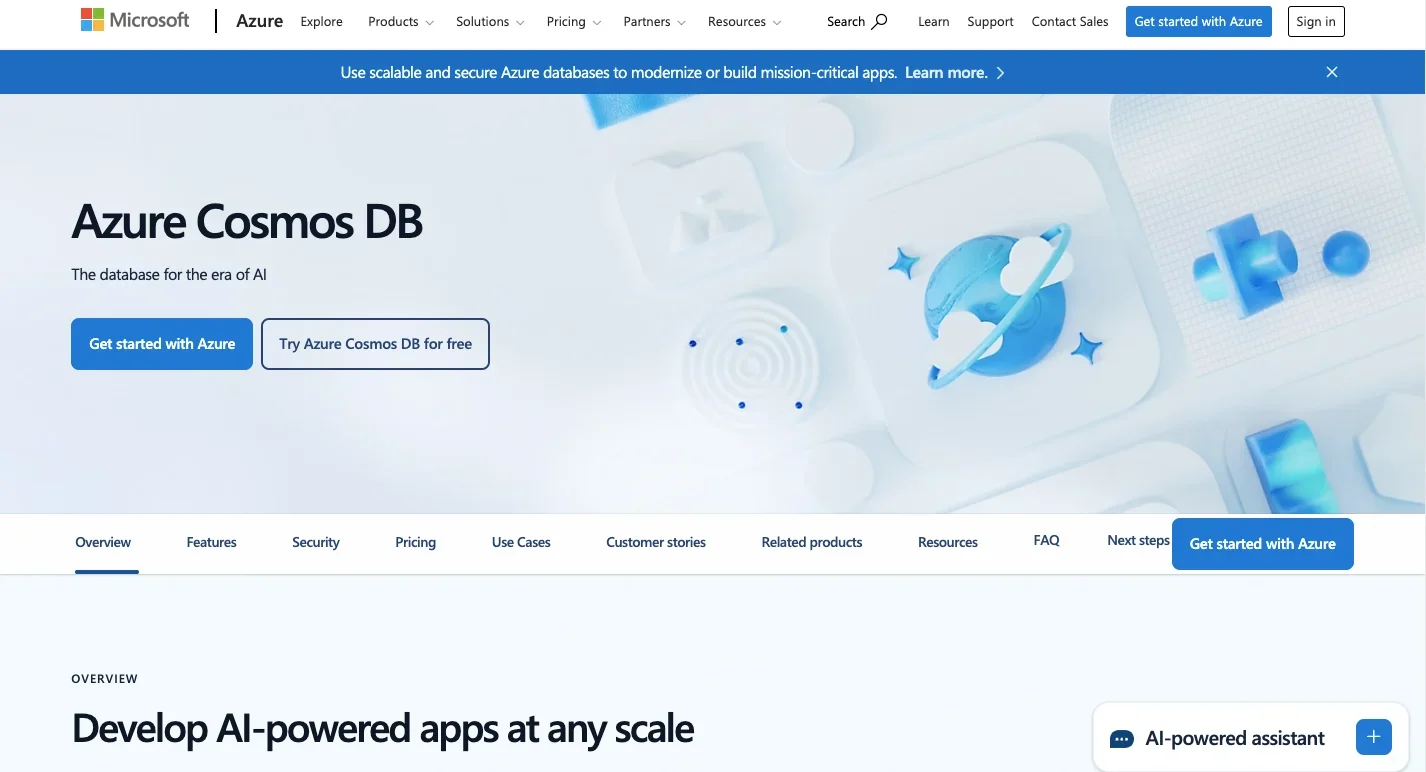
Azure Cosmos DB excels in providing a single database solution for all operational data needs. It specializes in handling complex data models like relational, document, vector, key-value, graph, and table. This versatility makes it ideal for applications requiring low latency and high availability across various industries.
Azure Cosmos DB is unique because it is fully managed by global distribution and has multi-model support. This database stands out by offering turnkey multi-region writes and data distribution capabilities, something few others offer, enabling real-time access and performance worldwide.
Notable Features of Using Azure Cosmos DB
- Multi-Model Support: Azure Cosmos DB supports multiple data models, allowing seamless integration of various database types.
- Global Distribution: It enables automatic and instant scalability across multiple regions, maintaining high availability and performance.
- Integrated AI Database Functionality: Azure Cosmos DB integrates with Azure AI services, enhancing app development with AI capabilities.
- Cost-Effective Scaling Options: Offers serverless and automatic scaling options, making it highly economical for handling variable workloads.
Azure Cosmos DB Pricing Plans
Azure Cosmos DB offers a flexible pricing approach tailored to each client's needs and requirements:
- Free Tier: Includes 1000 RU/s of throughput and 25 GB of storage.
- Serverless Option: Ideal for sporadic workloads, providing cost efficiency.
- Standard Pricing: Contact Azure for detailed pricing plans, as specific rates are tailored to usage and needs.
Businesses focusing on AI, IoT, and real-time applications benefit most from Azure Cosmos DB. Its ability to handle massive volumes of data and transactions makes it perfect for industries like digital commerce, gaming, and tech startups.
2. MySQL - Best for Scalable Data Management
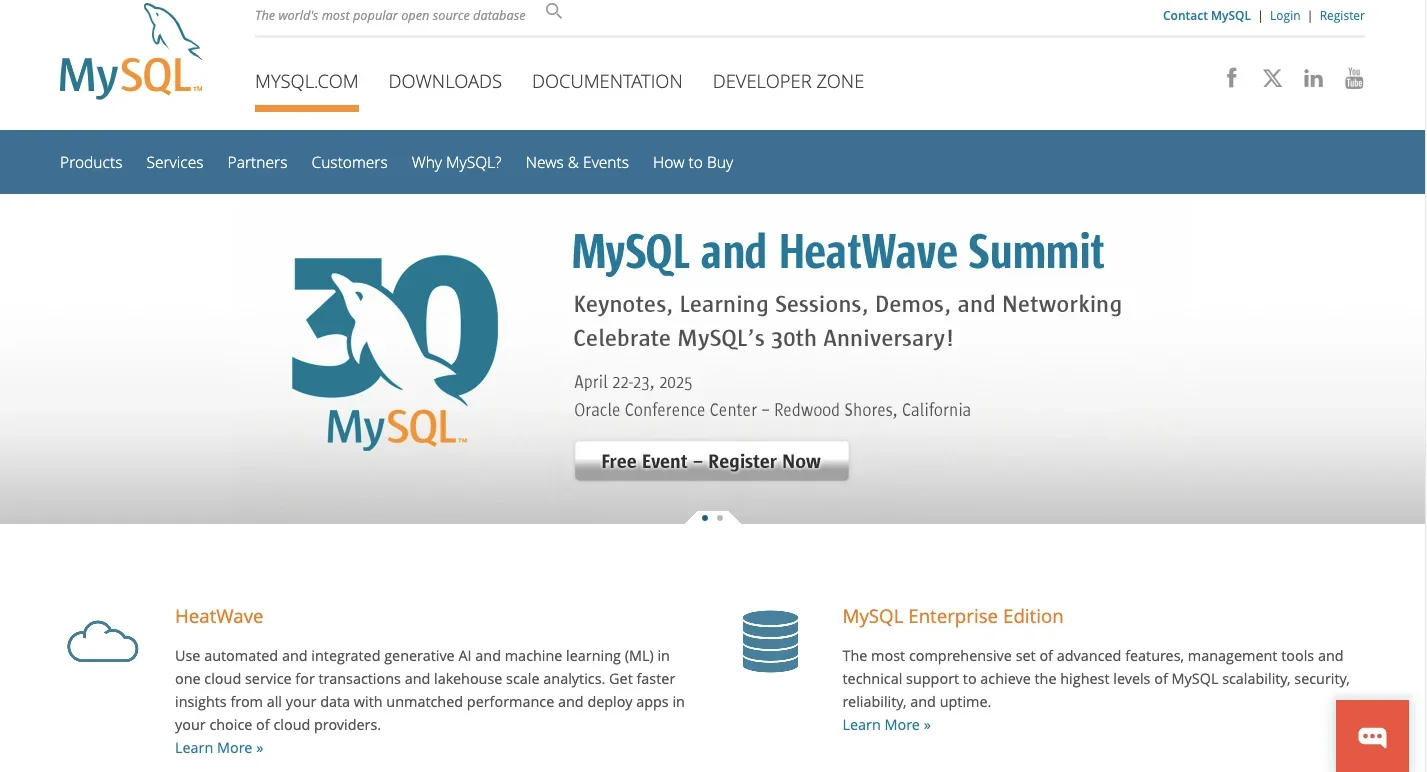
MySQL excels in managing scalable, high-performance data environments. It specializes in NoSQL capabilities, providing flexible data schema options for rapid application development and deployment. This makes it ideal for dynamic web-based applications and services that require efficient, scalable data management without the rigid structure of traditional relational databases.
MySQL stands out with its unique approach to data integrity and replication features. These capabilities ensure high availability and consistency across distributed systems, a feature that only a few databases offer with such reliability.
Notable Features of Using MySQL
- Flexibility and Speed: MySQL supports flexible schema design, allowing rapid changes to data structures without downtime and promoting fast development cycles.
- High Availability: Replication and partitioning features ensure data is always accessible, even in a system failure.
- Scalable Performance: It can scale out on commodity hardware, efficiently supporting massive databases and high transaction volumes.
- Robust Security: Offers advanced encryption and security features to protect sensitive data and comply with regulatory requirements.
MySQL Pricing Plans
MySQL dynamic pricing model tailored to each project's unique requirements:
- Community Edition: Free, open-source version ideal for developers and small applications.
- Enterprise Edition: Offers advanced features with subscription-based pricing. Contact MySQL for specific rates.
- Cloud Service Options: These are available on OCI, AWS, and Azure, and they have flexible pricing based on usage.
Startups, tech companies, and any business requiring real-time data access and high scalability benefit from MySQL NoSQL. Its ability to handle large data sets and high transaction rates makes it ideal for e-commerce, online gaming, and tech industries looking for robust, scalable database solutions.
3. MongoDB - Best for Dynamic Data Handling
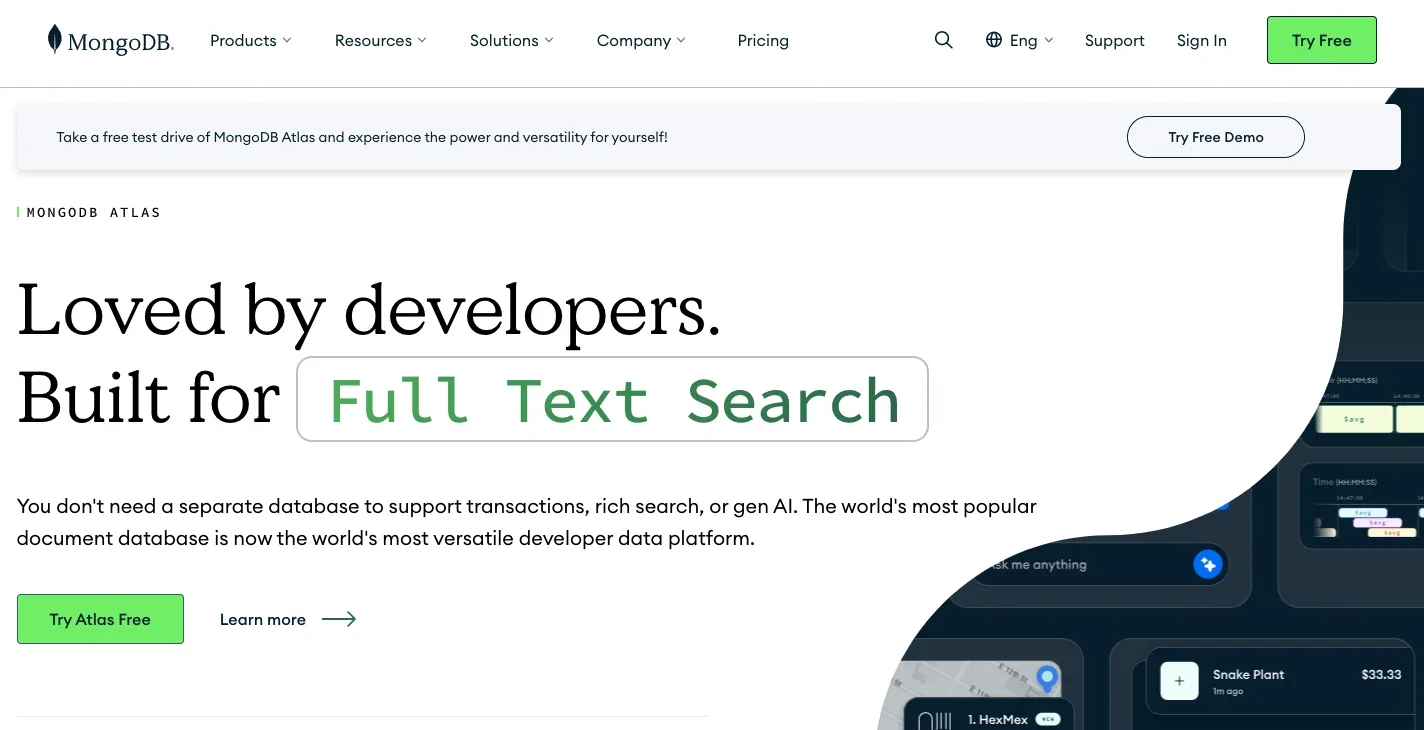
MongoDB excels as a NoSQL database platform and is best for dynamic data handling and real-time applications. It specializes in delivering a developer-centric data management experience focusing on flexibility and scalability across various use cases.
MongoDB has the unique ability to offer a fully integrated environment supporting operational and transactional data processes. This integration is uncommon among NoSQL database services, providing developers with seamless functionality for complex data operations without needing separate systems.
Notable Features of Using MongoDB
- Unified Data Platform: MongoDB provides a single unified platform for managing operational and transactional data, reducing complexity.
- Multi-Cloud Support: It offers deployment across multiple clouds, ensuring high availability and flexibility.
- Developer-Friendly Tools: With tools like MongoDB Compass and the Relational Migrator, developers can easily interact with their data and migrate databases smoothly.
- Scalability: MongoDB handles data at any scale with automatic scaling features, supporting growth seamlessly.
MongoDB Pricing Plans
MongoDB offers a range of pricing options to suit businesses of all sizes:
- Shared Clusters: Start for free with basic features suitable for learning and prototyping.
- Dedicated Clusters: Begin at $57 per month, offering more sophisticated controls and larger resource allocation.
- Serverless Instances: Pay only for what you use, ideal for sporadic traffic with variable demands.
Startups and enterprises developing real-time applications, IoT systems, and AI-driven technologies benefit most from MongoDB's capabilities. Its flexible schema and robust scaling options make it ideal for industries that manage large volumes of diverse data, such as tech, retail, and healthcare.
Key Takeaway
NoSQL Database Google Cloud offers flexible, scalable solutions for businesses managing large volumes of unstructured data. With its schema-less architecture, this platform allows for quick adaptation to various data types and faster querying than traditional SQL databases. Users benefit from reduced downtime and enhanced performance, making it ideal for enterprises with large, dynamic datasets.
When considering a NoSQL database solution, evaluate its integration capabilities and cost-effectiveness. These tools should support diverse data structures like key-value pairs, documents, and graphs, which are essential for modern applications. Ensure the solution aligns with your data management needs and offers robust support and security features to safeguard your information.
Interested in learning more about how a NoSQL database can transform your data handling capabilities? Explore Aloa's blogs more to see detailed use cases and benefits. Aloa can help you expand your technical capabilities with NoSQL Database Google Cloud. Contact [email protected] today to discover tools and resources that drive growth and innovation.

